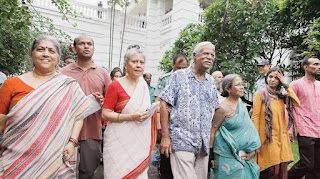 |
| Shireen Huq, Rehnuma Ahmed, Zafrullah Chowdhury, Farida Akhter, and Anusheh Anadil outside the ICT |
The Tribunal has now given its judgement on the 23 people who signed a statement critical of a previous judgment of the tribunal which had held that writings on this blog were in contempt of court, but refused to seek an unconditional apology. 22 were cautioned but exonerated. Zafrullah Chowdhury was convicted and sentenced to 1 hour in the custody of the court, with a fine of Tk 5,000
To read about the previous judgement
against this blog, click here
To read about proceedings involving the signatories to the statement, click here
In due course I will be writing quite a bit about this recent judgment. It raises a lot of interesting issues, (particularly when read along with the original judgement upon which the statement was commenting on), about how contempt law involving an alleged 'scandalization of the court' is interpreted by the Bangladesh courts and particularly the International Crimes Tribunal.
Whilst more and more jurisdictions either no longer have that kind of contempt law (for example, there is no such thing as contempt by scandalization in English law), the Bangladesh courts have an increasingly hardline and broad interpretation.
Here, I just want to make the point about how - unlike in Bangladesh - journalists in India are able to criticize court judgements without apparent fear of recourse to contempt applications by the courts, or by over enthusiastic lawyers.
A fine example of this is in a recent article on the political website the wire.in - concerning the alleged errors contained in a decision by the Karanataka High Court which acquitted the former Tamil Nadu Chief Minister J Jayalalithaa in a corruption case.
The article refers to 'glaring errors', 'jurists spitting fire' because of the poor quality of the judgement, the 'judiciary giving legal sanction to corruption', the High Court setting 'a bad precedent, one that encourages bribery', and a judgement that 'will bring down the image of the Indian judiciary in the world'
It is simply unimaginable that such an article could be published in Bangladesh - whether it be about a judgement of the ICT, or one of the High court - without ICT prosecutors or other lawyers (who see themselves as protecters of the dignity of the judiciary) immediately pressing for contempt charges being brought, with thunder and fury It is also difficult to see how a Bangladesh court would not proceed against the writer and publisher of such an article unless they immediately made an unconditional apology. In fact, it is doubtful that even an unconditional apology could exonerate person writing or publishing such an article
The title of the article itself would in all likelihood be sufficient for a contempt case in Bangladesh: 'More than bad maths: Four big errors that let jayalalithaa off the hook."
The article then goes onto state:
[M]ore serious errors of duplication have been found in Judge CR Kumaraswamy’s verdict. It now appears that the High Court has, erroneously, added loan amounts twice to the income of the defendants. This means that the amount calculated by the judge as ‘explained income’ — the basis on which the court has exonerated Jayalalithaa and others — is a highly inflated figure. ...
In fact, the High Court appears to have made some more glaring errors.
Jurists are spitting fire at the law used by Judge Kumaraswamy on Page 914 of his order acquitting Jayalalithaa. ...
“Is the judiciary giving legal sanction to corruption?” asked a retired High Court judge who did not wish to be named …
Legal eagles say that this ruling by the High Court judge could set a bad precedent, one that encourages bribery ...
The legal fraternity points out other errors in the judgement. ...
“This judgment will bring down the image of the Indian judiciary in the world …" he said.
[T]he legal fraternity is certainly chafing at what has taken placeThe question of course is this: if such comments do not bring the Indian judiciary into disrepute do not dishonor the Indian High court or justice system, do not demean 'the majesty' of the Indian courts, do not 'debase' the authority of the Indian High court, do not 'belittle the authority and institutional dignity' of the Indian justice system, do not 'severely shake the confidence of general people' in the authority of the Indian courts, do not create a 'hostile impression in the mind of public on the authority and competence of the court', and are therefore not subject to contempt proceedings in India - why then are far, far, far less serious criticisms of judgements given by Bangladesh courts deemed to do so, and be in contempt?
No comments:
Post a Comment